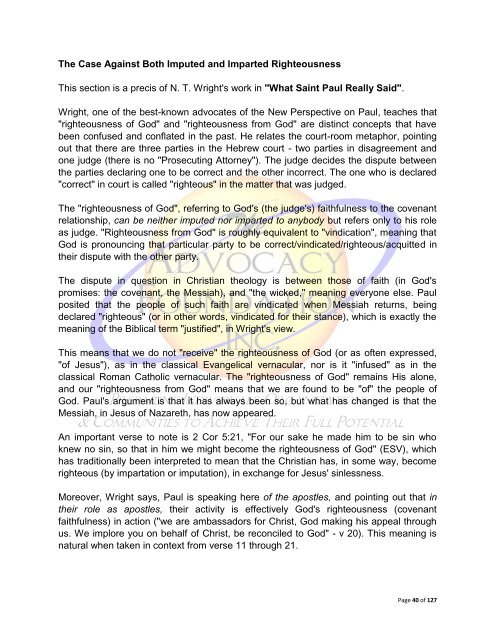Acquiesce to Righteousness
Acquiesce to Righteousness
Acquiesce to Righteousness
You also want an ePaper? Increase the reach of your titles
YUMPU automatically turns print PDFs into web optimized ePapers that Google loves.
The Case Against Both Imputed and Imparted <strong>Righteousness</strong><br />
This section is a precis of N. T. Wright's work in "What Saint Paul Really Said".<br />
Wright, one of the best-known advocates of the New Perspective on Paul, teaches that<br />
"righteousness of God" and "righteousness from God" are distinct concepts that have<br />
been confused and conflated in the past. He relates the court-room metaphor, pointing<br />
out that there are three parties in the Hebrew court - two parties in disagreement and<br />
one judge (there is no "Prosecuting At<strong>to</strong>rney"). The judge decides the dispute between<br />
the parties declaring one <strong>to</strong> be correct and the other incorrect. The one who is declared<br />
"correct" in court is called "righteous" in the matter that was judged.<br />
The "righteousness of God", referring <strong>to</strong> God's (the judge's) faithfulness <strong>to</strong> the covenant<br />
relationship, can be neither imputed nor imparted <strong>to</strong> anybody but refers only <strong>to</strong> his role<br />
as judge. "<strong>Righteousness</strong> from God" is roughly equivalent <strong>to</strong> "vindication", meaning that<br />
God is pronouncing that particular party <strong>to</strong> be correct/vindicated/righteous/acquitted in<br />
their dispute with the other party.<br />
The dispute in question in Christian theology is between those of faith (in God's<br />
promises: the covenant, the Messiah), and "the wicked," meaning everyone else. Paul<br />
posited that the people of such faith are vindicated when Messiah returns, being<br />
declared "righteous" (or in other words, vindicated for their stance), which is exactly the<br />
meaning of the Biblical term "justified", in Wright's view.<br />
This means that we do not "receive" the righteousness of God (or as often expressed,<br />
"of Jesus"), as in the classical Evangelical vernacular, nor is it "infused" as in the<br />
classical Roman Catholic vernacular. The "righteousness of God" remains His alone,<br />
and our "righteousness from God" means that we are found <strong>to</strong> be "of" the people of<br />
God. Paul's argument is that it has always been so, but what has changed is that the<br />
Messiah, in Jesus of Nazareth, has now appeared.<br />
An important verse <strong>to</strong> note is 2 Cor 5:21, "For our sake he made him <strong>to</strong> be sin who<br />
knew no sin, so that in him we might become the righteousness of God" (ESV), which<br />
has traditionally been interpreted <strong>to</strong> mean that the Christian has, in some way, become<br />
righteous (by impartation or imputation), in exchange for Jesus' sinlessness.<br />
Moreover, Wright says, Paul is speaking here of the apostles, and pointing out that in<br />
their role as apostles, their activity is effectively God's righteousness (covenant<br />
faithfulness) in action ("we are ambassadors for Christ, God making his appeal through<br />
us. We implore you on behalf of Christ, be reconciled <strong>to</strong> God" - v 20). This meaning is<br />
natural when taken in context from verse 11 through 21.<br />
Page 40 of 127

















